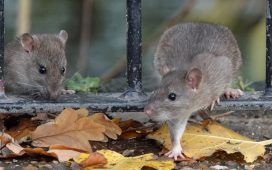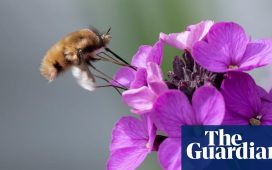Had I stood this close to the wood ants’ nest on one of last spring’s warm days, some aggressive defenders would already be climbing my trousers and biting me. Their domed nest, thatched with Sitka spruce needles, stretches for over six feet down the bank beside the forest trail. Had this been a hot summer afternoon, the seething crowd of workers on its peak would resemble boiling black volcanic lava, trickling down the slope as they set out on foraging expeditions.
But this morning – cold and wet again – just a few score occupants are scattered over its surface, busy with housekeeping. A chance to have a good look at the astonishing instinctive social organisation of these predatory ants, introduced to control conifer insect pests.
Colony hygiene seems to be today’s priority, and several are bringing out their dead. Hauling rigid, stiff-legged corpses over the uneven surface is laborious work, so most choose to link jaws with their dead comrades, finally dumping them away from the nest. Other workers are carrying what seem to be tiny silk duvets in their jaws, which must be cocoons of recently hatched adults.

How are these tasks allocated? Are there specialist ant undertakers, or does any worker instinctively extract casualties? Is the first task of the newly hatched to dispose of the cocoons that kept them warm during development? The social responsibilities of the ant heap are an enigma.
But what is certain is that a new generation is hatching. This ant metropolis will be home to at least 100,000 by midsummer and, deep in subterranean galleries and chambers, several queens will be relentlessly laying more eggs.
I can see a few winged males milling around on the surface. New arrivals from another nest, searching for a queen to impregnate? Or newly hatched males about to disperse to another colony? I can’t linger for long, to find out. A defender has climbed my dangling camera strap and, standing on its hind legs, squirts formic acid at me from the tip of its abdomen. Time to leave them to their housework.







